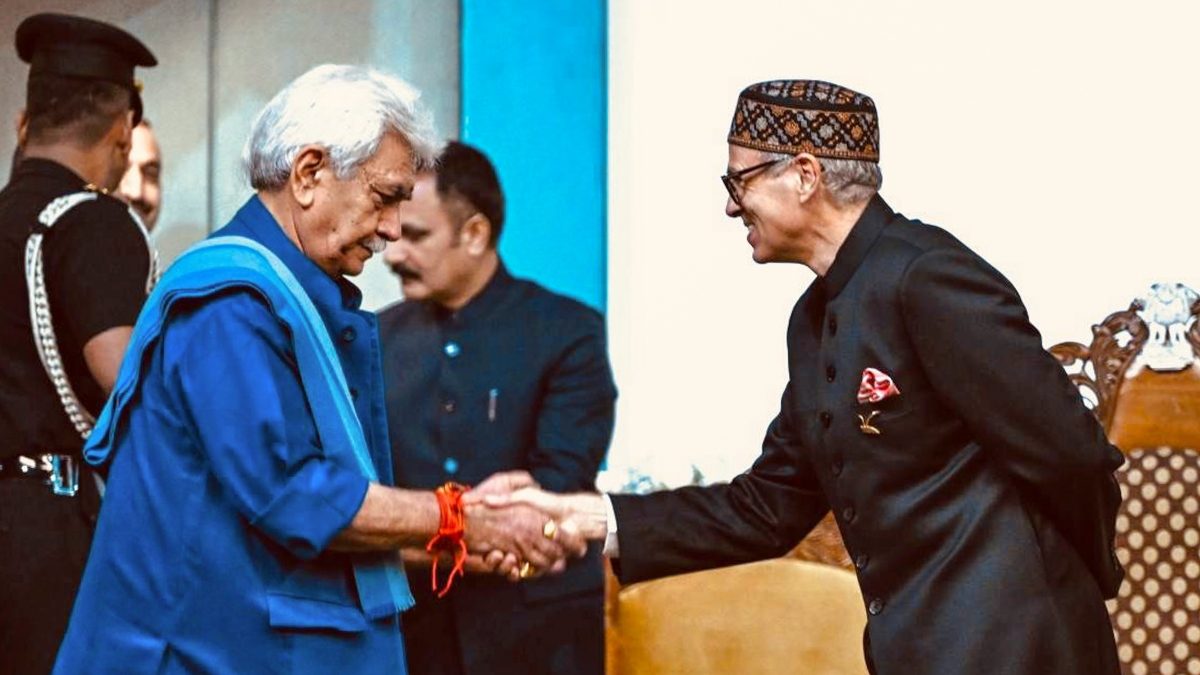The political landscape in Jammu and Kashmir has taken an interesting turn with the recent decision of the Lieutenant Governor Manoj Sinha to approve a resolution passed by the Omar Abdullah-led cabinet. This resolution, passed unanimously, urges the central government to restore statehood to the Union Territory. The move comes after a series of developments including the 2019 revocation of Article 370, the subsequent bifurcation of the state, and the formation of a new government in J&K. While the cabinet decision emphasizes the need to restore statehood and the need for a healing process, several political parties have expressed their disapproval, accusing the National Conference of backing away from its earlier commitment to restore Article 370 and Article 35A, which were removed alongside the removal of special status from Jammu and Kashmir. The restoration of statehood has become a central political discourse in J&K, with various stakeholders expressing differing perspectives. This article will delve into the recent developments, analyzing the implications of the cabinet resolution and the criticisms surrounding it.
The Cabinet Resolution: A Call for Restoration of Statehood
The Jammu and Kashmir cabinet’s unanimous decision to seek the restoration of statehood is a significant step in the ongoing political discourse. It represents a clear demand from the government in the UT for a return to the pre-August 5, 2019 status quo. The decision is being lauded as a step towards healing the wounds of the past, reclaiming the constitutional rights of the people, and reaffirming their identity.
Implications of the Resolution
The resolution’s endorsement by the Lieutenant Governor adds another layer of importance to the decision, highlighting its significance and signaling that it is not simply a symbolic gesture. This decision will likely trigger a fresh debate about the future of J&K, raising the following questions:
- What are the next steps? Will the cabinet take concrete action to convince the central government to restore statehood, and what steps will be taken to further the agenda for restoration?
- How will the central government react to the request? Will the Modi government be willing to consider the cabinet’s request for restoration of statehood, given the complexities of the situation and the potential for political implications?
- What are the political implications of the restoration of statehood? Would this have an impact on the current political landscape, affecting the power dynamics in the UT, the relationships with the centre, and the political processes within the region?
Criticism and Doubts: A Divided Opinion
Despite the seeming unanimous decision in the cabinet, the cabinet resolution on statehood has not gone without criticism from other political parties, including the People’s Democratic Party (PDP), People’s Conference (PC), and Awami Ittehad Party (AIP). These parties claim that the NC has compromised on its pre-election promise to strive for the restoration of Article 370 and 35A. They believe that the focus should not be limited to statehood alone but should include the restoration of these provisions, which are considered crucial by many in J&K for preserving their identity and cultural distinctiveness.
The Importance of Article 370 and 35A
The restoration of Article 370, which conferred special status on Jammu and Kashmir, and Article 35A, which granted certain privileges to permanent residents of J&K, is crucial for several groups, including:
- Ethnic and cultural minorities: Many believe that the removal of these articles has endangered their identity and culture.
- Landowners and residents: The revocation of these provisions raised concerns about their land ownership and the ability to control migration, which had been guaranteed by these provisions.
- Political autonomy: The restoration of Article 370, with the right of autonomy and self-governance, was seen as an important step towards strengthening the autonomy of Jammu and Kashmir.
The Need for Dialogue and Consensus Building
The current political climate in Jammu and Kashmir demands a constructive and open dialogue between the government and the people, allowing for different perspectives and concerns to be heard and addressed. This includes a discussion on the political and social implications of the recent decisions, addressing anxieties about the future of J&K, and finding common ground to navigate this complex situation.
Potential Solutions and Moving Forward
While there is no easy solution to this intricate issue, there is a need to foster open dialogue and explore all avenues for resolving these contentious issues. Some suggestions for moving forward include:
- Reconciliation and healing: Prioritizing a healing process that addresses the concerns of the people and brings a sense of stability and justice to the UT.
- Focus on development: Focusing on building a better future for J&K by investing in infrastructure, education, and economic opportunities.
- Building consensus: Reaching a common ground through open dialogue and engagement with all stakeholders, acknowledging the complexities and diversity of perspectives.
- Respecting autonomy: Acknowledging the need for autonomy and self-governance within the framework of a united India.
Takeaways
The restoration of statehood has ignited a crucial debate in Jammu and Kashmir. While the cabinet decision emphasizes a return to pre-2019 normalcy, it has also sparked critical analysis and division among the political parties, exposing the complex reality of J&K’s political landscape. It is essential that the political process in J&K includes open dialogue and active participation of all stakeholders. Finding common ground, prioritizing reconciliation, and acknowledging the need for autonomy are vital for creating a stable and prosperous future for Jammu and Kashmir.




